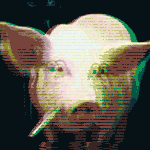|
I'm pretty sure Orcs farm, if for no other reason than that Morgoth had to do something to feed his hordes before the awakening of Men and his mass enslavement of Elves. Agriculture is practiced in the south of Mordor, where moisture from an inland sea and volcanic ash from Mount Doom make the region something of a breadbasket, but it's enslaved Men who live there. There are elf laborers. I don't know if they till soil per se, but they obviously do something to feed the nobles and craftsmen.
|
|
|
|

|
| # ? Apr 27, 2024 18:06 |
|
poisonpill posted:Are all elves nobility? Are there like peasant elves tilling the field? All the important ones are. There’s a couple of named elves who are retainers of nobility instead, like Haldir, or the elf-king’s butler. Then there’s Gildor, who is “of the House of Finrod” in some sense but can’t possibly be literally related to Finrod. Elves make bread and they make a big deal out of that, so there must be elvish farms worked by elvish farmhands somewhere. quote:Do orks farm? Do they have a hierarchy? Hard to imagine orcs patiently tilling the soil. They must have been fed from somewhere though. Maybe they keep stock. They eat people on occasion, but they seem to have a cannibalism taboo, so who knows what they eat most of the time. Sauron fed his armies off huge slave plantations (the slaves were human) in southeastern Mordor. As to classes, there’s no nobility that we see, but there is a military elite. There’s definite tension between some kinds of orcs along what could be considered caste lines, and “slave” is used as an insult by soldiers for smaller and weaker orcs.
|
|
|
|
poisonpill posted:Are all elves nobility? Are there like peasant elves tilling the field? There is a large peasant class of Elves that exist to be ruled over by their Noldorin betters. Its an extremely stratified society where blood matters most.
|
|
|
|
Ooh yeah, the butler. In fact I think the very first time I read the Hobbit, before I'd ever encountered anything else by Tolkien, I was surprised and rather charmed by the idea of elves working in menial jobs like guarding the prisons or kicking wine barrels out trap doors. It seemed transgressive against ... I don't know what ideas I already had about elves at that age or from where, but it seems like it was the first of many cases where I was fascinated by worldbuilding that went a level deeper than I was used to.
|
|
|
|
|
skasion posted:e: like, Bilbo (pre-treasure) is rich enough that he does absolutely nothing to earn a living and apparently never has. Probably “gentry” would be a more appropriate term. quote:Frodo himself, after the first shock, found that being his own master and the Mr Baggins of Bag End was rather pleasant. Italics are Tolkien's; he's pretty clearly supposed to be a country squire. The question of where the Baggins money comes from when Mr Baggins himself isn't off burgling dragons or chasing Black Men up mountains remains unclear. If there are any rent-paying holdings around Hobbiton, they clearly aren't enough on their own to support the upkeep of Bag End, otherwise Frodo's cover story about being forced to sell up and remove to Crickhollow because he's running out of money wouldn't hold any water. What we do know, from right at the start of The Hobbit, is this: quote:Not that Belladonna Took ever had any adventures after she became Mrs Bungo Baggins. Bungo, that was Bilbo’s father, built the most luxurious hobbit-hole for her (and partly with her money) that was to be found either under The Hill or over The Hill or across The Water, and there they remained to the end of their days. The Tooks are richer than the Bagginses, but the Bagginses are far more respectable, even though the Thain is a Took. I think the most likely explanation, then, is that Bilbo lived well off the family money passed down to him by his parents, possibly with the occasional shrewd business deal from time to time (Bungo had enough nous to lay down a large number of excellent bottles of vintage Old Winyards) to keep the coffers replenished, and there would have been the prospect of marrying into more money (if necessary) later in life. He then leaves Frodo with enough money to himself live comfortably for many years, even though "the Smaug vintage" is apparently near exhaustion (of course, Bilbo also appropriated a great deal of gold from the trolls). Frodo's financial position is probably rather better than the hobbits of the Shire are led to believe, and whatever he passes on to Sam plus whatever income eventually comes to him through Rosie and "the very considerable rise in the fame and fortune of the Cottons" must have been good enough to support them at Bag End. (I do enjoy how LotR starts with Frodo becoming Mr Baggins of Bag End, and finishes with Sam marrying a farmer's daughter and becoming Mr Gamgee of Bag End.) You know what else I found interesting while writing this? The word "money" appears twelve times in Book 1, mostly at the start. Its last appearance is just before they fend off the Ringwraiths at Weathertop; and it doesn't re-appear until the Scouring, when Farmer Cotton questions where Lotho's money came from. Nobody outside the Shire seems concerned to have a few pennies about them to cover incidental expenses.
|
|
|
|
Like all nobility the Baggins original wealth comes from plunder. Unlike most nobility you don't have to look very far back through the family tree to see it.
|
|
|
|
Yeah makes sense. Your money’s no good between Bree and Gondor (neither the elves nor the Rohirrim seem to use it at all), and the hobbits are not expected to foot the bill for themselves among either of those peoples, nor in Gondor where they have friends in high enough places. I wonder if Sauron pays his soldiery.
|
|
|
|
Nah, the treasure Bilbo brought back from Erebor was paid to him as wages from the treasury of the indigenous government, whose head of state employed him. The Dwarves of Erebor were the original inhabitants of that area, and the money was mined, minted, and stored there by them until they were scattered. Exploitation went on, surely, but no plunder. Even Smaug's colonization arguably didn't involve any plundering as such, because the wealth never left the mountain!
|
|
|
|
Is "mister" a word that has roots in things like nobility? I always felt like it was a "plain" thing. Like, not specifically important, but broadly respected. Also, what's the difference between nobility, aristocracy and gentry?
|
|
|
|
Are you serious, ironic, or just posting some weird Sinarillian footnote written by JRR to justify by analogue the plundering of the colonies by England?
|
|
|
|
I'd argue Bilbo is distaff nobility / gentry. He's the Hobbit equivalent of Mister Darcy in Pride and Prejudice; technically a commoner, but a relatively noble Took on his mother's side, just as Darcy's mother was the daughter of an Earl.
|
|
|
|
|
"Aristocracy" relates to government rather than rank per se; it means governance by a distinct ruling class, and nobility is historically one of the most common ways to delineate the ruling class. Specifically, the ruling class and the nobility are synonymous; nobility are those whose rank (which is hereditary) gives them the legal privilege to rule over some others, and higher ranks grant correspondingly higher authority. The gentry are the class below the nobility. In that sense they're a middle class, but from a modern perspective they wouldn't correspond strongly to what you'd call the middle class. Gentry own property and typically don't have to work, but they don't have noble rank. This is all subject to the finer points of local law, of course. In England, which Tolkien was drawing on for Hobbitry, a given noble title could only be inherited by one heir rather than the whole family; the more distant relatives of nobility would inherit wealth, property, social connections, etc., but they held no rank. These people would be the gentry. As the noble class system gave way to later systems, the already-nebulous concept of gentility diffused so far that all that was necessary to be a gentleman was to act like one. But that hadn't happened in the still-feudal Shire.
|
|
|
|
poisonpill posted:Are you serious, ironic, or just posting some weird Sinarillian footnote written by JRR to justify by analogue the plundering of the colonies by England? In the story as written, no colonization actually took place in the recent backstory of The Hobbit. It's a noticeable omission in his work, and that omission is itself the "justification." Even when actual colonization took place in his work - like the Noldor conquering Beleriand, or the Númenoreans establishing colonies in Middle-Earth - he rarely considered the perspective of the colonized, much less was sympathetic to it. Though it did happen occasionally. Edit: I mean, the whole thing can be taken as a whitewashing of colonialism, but the contrivance going on there is clear. Bilbo goes off to foreign lands and comes back with a ton of loot: seems pretty obvious, right? Which is why he's careful to set up that the treasure lawfully, rightfully, originally, and provably belonged to Thorin's people, and Thorin agreed up front to give him a share of it when for reclaiming it from the actual colonizer Smaug. Which - well, it is a work of fantasy, after all. Bongo Bill fucked around with this message at 01:10 on Sep 4, 2018 |
|
|
|
poisonpill posted:Are all elves nobility? Are there like peasant elves tilling the field? Apparently Tolkien's "Of Lembas" in The Peoples of Middle-Earth talks about this, albeit tangentially. tolkiengateway.net posted:The Yavannildi (Quenya for "Maidens of Yavanna"; Sindarin Ivonwin) were the elven-women that knew the secrets to making lembas. Only they were allowed to handle the ear of the corn that would become the wafer.[1] So the elves grow corn at the very least, although it sounds more like this particular crop was more ritually harvested than left to any old peasant elves. And they are elves, so it's probably less "manual labor" and more singing the plants to grow or some other bullshit.
|
|
|
|
Radio! posted:And they are elves, so it's probably less "manual labor" and more singing the plants to grow or some other bullshit. This is usually how I think of it. It's still definitely work - but, because they're elves, it's not grueling toil like Adam was cursed with.
|
|
|
Radio! posted:Apparently Tolkien's "Of Lembas" in The Peoples of Middle-Earth talks about this, albeit tangentially. Whose phrasing is "ear of corn" there? Did Tolkien use "corn" to mean maize? Seems unlikely from a British perspective.
|
|
|
|
|
Tolkien uses “corn” in the essay, probably in its general sense of any cereal rather than to mean maize. It could be literally maize though. Middle-earth has a good number of what ought to be new world plants. e: no, having read on I find that it was a particular heavenly cultivar: quote:Now this corn had in it the strong life of Aman, which it could impart to those who had the need and right to use the bread. If it was sown at any season, save in frost, it soon sprouted and grew swiftly, though it did not thrive in the shadow of plants of Middle-earth and would not endure winds that came out of the North while Morgoth dwelt there. Else it needed only a little sunlight to ripen; for it took swiftly and multiplied all the vigour of any light that fell on it.
|
|
|
|
The money thing is interesting. I looked a little one day and found some page that mentioned that Tolkien only mentions money and coins like 10 times in all of his writings. He doesn't really go into what they use for coins and really only mentions money in an abstract and aloof way (like, Bilbo's stash of gold, etc.) I assume a lot of Northern money was probably Dwarvish, or maybe they still had old Arnorian coins floating around and just didn't know what was on them. I figure Eriador is kind of like the Western Roman Empire after the Empire fell, with no regular trade and bartering being used instead of coin. Since Gondor is more like a medieval European style kingdom I'm guessing they had their own coinage since they still have a central government.
|
|
|
|
Gondor does have coinage. I don’t recall if it comes up anywhere in LotR but there’s a mention of it in Peoples of Middle-earth: the word for “farthing” (of the Shire) is also the word for a silver piece worth 1/4 of the standard coin.
|
|
|
|
skasion posted:Middle-earth has a good number of what ought to be new world plants. 
|
|
|
skasion posted:Hard to imagine orcs patiently tilling the soil.
|
|
|
|
|
Data Graham posted:Whose phrasing is "ear of corn" there? Did Tolkien use "corn" to mean maize? Seems unlikely from a British perspective. Wheat has ears too, as do other cereals; I very much doubt he was thinking of maize.
|
|
|
|
Radio! posted:Apparently Tolkien's "Of Lembas" in The Peoples of Middle-Earth talks about this, albeit tangentially. When only a specific class of people is allowed to perform a certain task it's unlikely that the work is pleasant or glamorous. Tolkien's Elves are of course not the "sing to their supper" hippies of modern fantasy drivel. They hunt, they feast, they war, they ruin their entire civilisation with vendettas etc. sassassin fucked around with this message at 12:07 on Sep 4, 2018 |
|
|
|
I'm sure orcs generally prefer to force people that aren't orcs to till the soil, but if the only people around to force to till the soil are other orcs that's just how it's going to be.
|
|
|
|
sassassin posted:When only a specific class of people is allowed to perform a certain task it's unlikely that the work is pleasant or glamorous. Tolkiens Elves loving rule.
|
|
|
|
sassassin posted:When only a specific class of people is allowed to perform a certain task it's unlikely that the work is pleasant or glamorous. It’s sacerdotal work conducted by women of high rank. Tolkien’s description of the unusual method by which the Valinorean grain must be harvested (no blade can be used to harvest the ear, the grain must be stored in containers woven of the stalks of the plant) make its religious purpose clear enough. Lembas isn’t widely eaten, it’s a sacred bread for special purpose. The (exclusively female) masters of the art keep their baking practice a total secret from male loremasters such as Pengolodh, our author, and are named for a god whose conduct they are ritually re-enacting. Conclusion: elven noblewomen are not hippies but brahmins, which is also (explicitly) why they never go to war and (implicitly) why elven noblemen never, ever chase human noblewomen.
|
|
|
|
skasion posted:It’s sacerdotal work conducted by women of high rank. Tolkien’s description of the unusual method by which the Valinorean grain must be harvested (no blade can be used to harvest the ear, the grain must be stored in containers woven of the stalks of the plant) make its religious purpose clear enough. Lembas isn’t widely eaten, it’s a sacred bread for special purpose. The (exclusively female) masters of the art keep their baking practice a total secret from male loremasters such as Pengolodh, our author, and are named for a god whose conduct they are ritually re-enacting. Conclusion: elven noblewomen are not hippies but brahmins, which is also (explicitly) why they never go to war and (implicitly) why elven noblemen never, ever chase human noblewomen. Or it's like irl maize and treated with lye to make it edible/more nutritionally available. The caste of Elven women who prepare the lembas are covered in chemical burns.
|
|
|
|
sassasin, your posts are pretty dumb btw (USER WAS PUT ON PROBATION FOR THIS POST)
|
|
|
|
Monglo posted:sassasin, your posts are pretty dumb btw Do u even post
|
|
|
|
Monglo posted:sassasin, your posts are pretty dumb btw It isn't dumb to read the text. Tolkien's Elves are not positive role models once you read beyond Frodo's personal vision of them. Given how much Tolkien wrote about the downfall of their various societies, and how his own old-fashioned prejudices shaped many of the cultures in his books, it's unreasonable to them assume the best of them when it comes to the production of their calorie-dense snack bars. They were made of corn and we know how corn is processed. To assume the select caste of women that were made to produce them did it by singing lullabies betrays a misunderstanding of both Tolkien and of reality.
|
|
|
|
SHISHKABOB posted:Is "mister" a word that has roots in things like nobility? I always felt like it was a "plain" thing. Like, not specifically important, but broadly respected. 'Mister' derives from 'Master', and was previously used to refer to someone who had some sort of standing and authority, but not an actual titled rank. This would often be someone who was part of a family that was titled but did not stand to inherit - this kind of flows with the power of the original title, so the family of a Duke receives precedence further out than a Baron. The youngest son of a Duke would be styled as The Lord SHISHKABOB, and would be addressed as 'Lord Shishkabob', but the son of a Baron is only titled as The Honorable SHISHKABOB and would be addressed as 'Mr. Shiskabob'. Britain ended up with a profusion of noble families such that many members of them could not hold land or titles in their own right, and would end up doing a variety of things; serving in the military, being merchants or traders, etc. This whole group is generally considered 'Gentlemen', distinct from landed titles and their heirs, and gradually became muddied into meaning just a respectable man. Bilbo is 'Mr. Baggins' because he owns Bag End and is wealthy enough to hire some menial staff (such as the Gamgees). One thing that people may not realize is that the historical ownership of land is very different in the UK and the US. In the US, when people buy property they generally buy the land and any structures on it all together; the exception being housing that is explicitly considered temporary or transitive like trailers and mobile homes. In the UK, this is called a 'freehold'. But it was also relatively common for landholders to lease their land to others on extremely long terms - usually something like 100 years, but as little as 40 and as many as 900. In this situation, which is a 'leasehold', you own the buildings and structures, but you pay 'ground rent' to the owner of the land. Historically this was a way for landed nobility to translate their property into income while maintaining the technical ownership, and avoiding making landowners of the people who would live and work there. This is what makes being 'landed' significant - not everyone who owns a house or a farm, even a sizable one, would be a landowner, and many times when you buy a house, you are only buying the structure and the right to the current leasehold. I don't know how much of this applies to Middle Earth, but its the context in which Tolkien would have been writing. So while the Gamgees have their own house, it's entirely likely they are leaseholders and the land is owned by someone else - possibly even Bilbo, because Bagshot Row was created during the construction of Bag End.
|
|
|
|
Leasehold is still pretty common here and you need to look out for it in the smallprint when thinking about buying a house.
|
|
|
|
reignonyourparade posted:I'm sure orcs generally prefer to force people that aren't orcs to till the soil, but if the only people around to force to till the soil are other orcs that's just how it's going to be. I'm pretty sure Orcs would try to pillage and raid for food before growing it, but I guess if they had to they would find a way. That does beg the question though of how the Orcs in Moria were supplied and fed. That's pretty far from Mordor to send supply trains, and there's not a lot of people nearby for them to steal from. They'd have no chance of raiding Lorien without getting owned thanks to Galadriel and her ring, and there's no Dwarves nearby any more. There are Humans in between Mirkwood and the Misty Mountains, but they're a hardcore folk led by the descendents of a dude who turns into a fuckin' bear, so I doubt the Moria orcs hosed with them much. So how did they eat? Unless the Dwarves that used to live in Moria left behind some type of self sustaining food economy but it's explicitly mentioned in the Hobbit that the Dwarves of the Lonely Mountain didn't grow or make their own food supplies and that they traded with men for that stuff. So I doubt the Dwarves of Moria would have been any different. My guess is that Orcs can last on minimal amounts of food and water far better than normal creatures could. Even then I don't know how the force of Orcs in Moria would be self sustaining unless they were getting supplied from elsewhere but like I said that's a long way to send supplies to.
|
|
|
|
It's fungus, bro.
|
|
|
|
The Moria orcs are definitely not supplied from Mordor. They don’t have anything to do with Mordor (Grishnakh’s band are as dismissive of them as the Isengarders are, and the northerners for their part refuse to accept Ugluk’s orders without violence) and Sauron has his own orc armies at Dol Guldur to project power across Wilderland.Poldarn posted:It's fungus, bro. Yeah sure, let’s go with this. It works in Dwarf Fortress.
|
|
|
Ginette Reno posted:I'm pretty sure Orcs would try to pillage and raid for food before growing it, but I guess if they had to they would find a way. There are a few different possible explanations for Orc diets I think: 1) Orcs kept a lot of livestock/slaves (this is the canonical explanation -- "Neither he nor Frodo knew anything of the great slave- worked fields away south . . . nor of the great roads that ran away east and south to tributary lands, from which the soldiers of the Tower brought long waggon-trains of goods and booty and fresh slaves. Here in the northward regions were the mines and forges"). Presumably, the Moria orcs keep similar thralls and stock, just off-screen. 2) Orcs did a lot of raiding and hunting (see, e.g., Beorn's enmity -- I'd argue Beorn's glee speaks to raiding conflicts) 3) "Orc" is just an elvish propaganda term for "industrializing human" a la The Last Ringbearer and Tolkien's presentation of them is deeply racist and slanted Hieronymous Alloy fucked around with this message at 16:15 on Sep 4, 2018 |
|
|
|
|
sassassin posted:They were made of corn and we know how corn is processed. To assume the select caste of women that were made to produce them did it by singing lullabies betrays a misunderstanding of both Tolkien and of reality. In the English usage, "corn" refers to any cereal. Tolkien absolutely knew this and surely you know it to, but you're too enamored with making some weird point about lye-burned elfin proletariat running a loving tortilla factory.
|
|
|
|
Maybe they had a steady supply of
|
|
|
|
Incidentally, looking over book 3 chapter 3 also reminds me that orcs drink liquor and eat bread and meat (Pippin suspects it might be people but maybe he’s just a wuss), and that Mordor’s soldiery is paid (or at least the Moria-orcs think it is).
|
|
|
|

|
| # ? Apr 27, 2024 18:06 |
skasion posted:Incidentally, looking over book 3 chapter 3 also reminds me that orcs drink liquor and eat bread and meat (Pippin suspects it might be people but maybe he’s just a wuss), and that Mordor’s soldiery is paid (or at least the Moria-orcs think it is). Which implies that orcs can choose a career other than "soldier" if it pays better
|
|
|
|





































